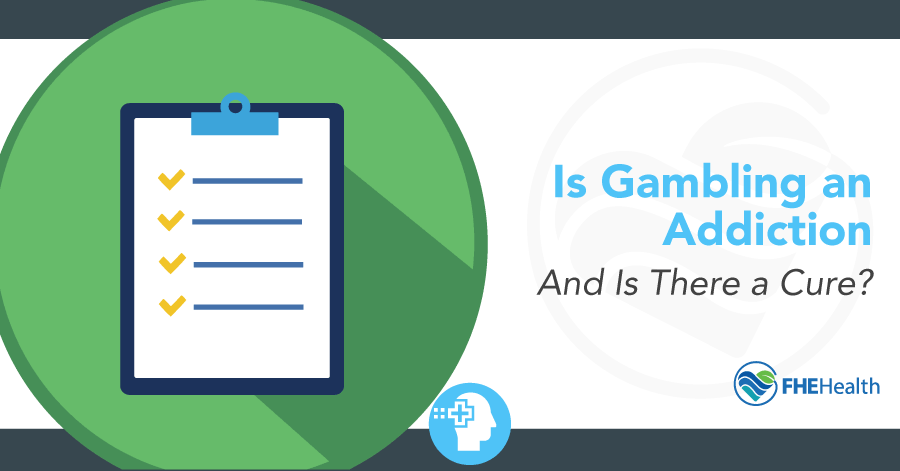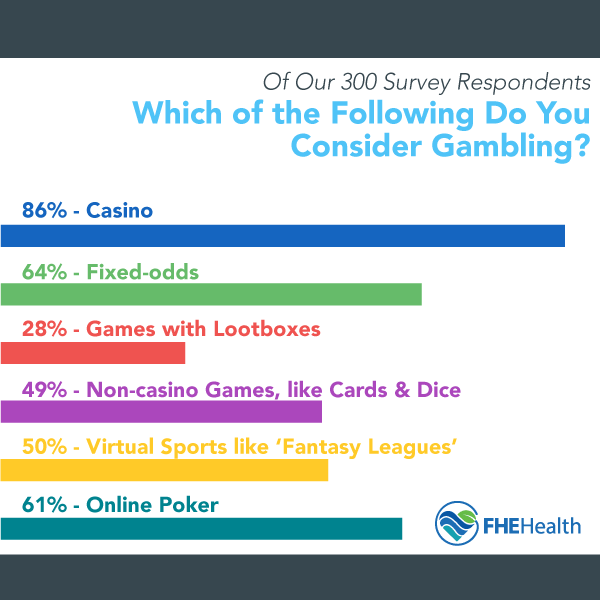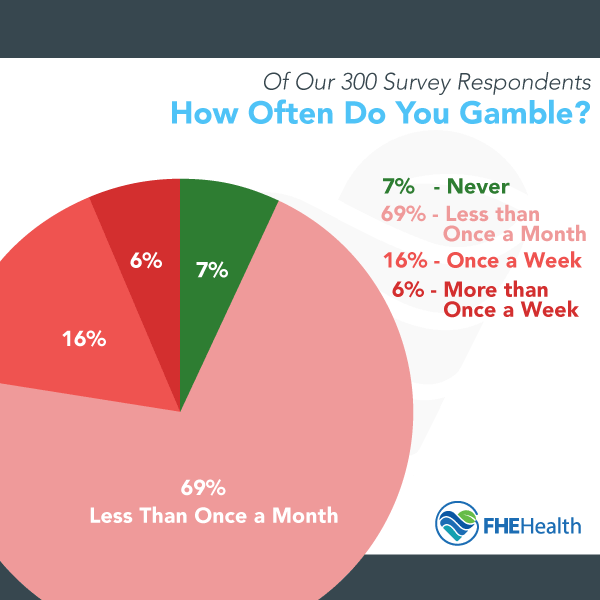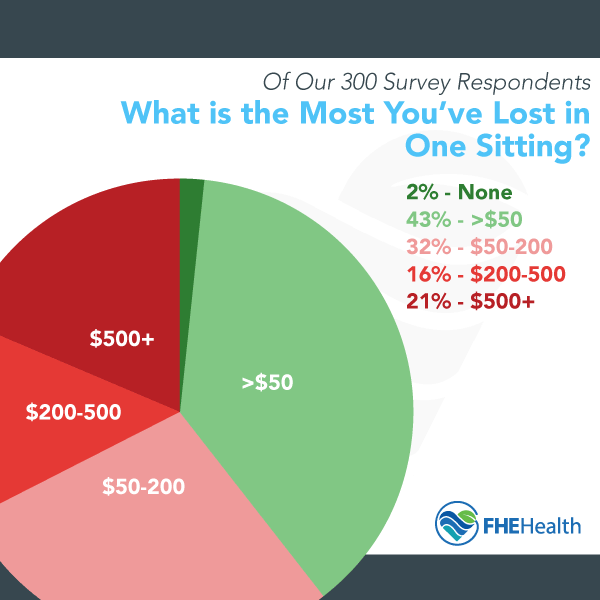
While we label many behaviors as addictive, there is only one non-substance-related type that is considered a disorder in the DSM. That disorder is Gambling addiction. The designation and opinions about gambling disorder vary greatly among people as well. While heroin use is an activity almost everyone would consider a clear sign of abuse, scratch-off tickets or even a high-stakes bet don’t carry the same stigma.
FHE Health has conducted a large survey on opinions and experiences around gambling. Take our quiz to see where you rank among the general consensus, the results may surprise you!
Quiz: Gambling Opinions
Our Survey Results
The Difference Between Problem Gamblers and Pathological Gambling
 According to FHE Health and compulsive gambling specialist Susan Naversen, MS, AP-DOM, “Gambling addiction is the first non-substance to be included as an addiction in the DSM-5. The DSM-5 is what mental health professionals and insurance companies use as a guide when officially diagnosing psychological disorders such as behavioral addiction.”
According to FHE Health and compulsive gambling specialist Susan Naversen, MS, AP-DOM, “Gambling addiction is the first non-substance to be included as an addiction in the DSM-5. The DSM-5 is what mental health professionals and insurance companies use as a guide when officially diagnosing psychological disorders such as behavioral addiction.”
Mental health professionals recognize four types of gambling: social, problem, pathological and professional. Most people are social gamblers. They may gamble once or twice a year for fun, usually with family or friends, and remain cognizant of how much they spend on gambling.
Professional gamblers typically live in Las Vegas or visit Las Vegas frequently. They rely on gambling as a way to make a living.
In addition, professional gamblers understand that casinos rig their games in favor of the house. Consequently, they spend years learning the “science” of gambling and the trick of counting to increase their chances of big payouts.
Problem or compulsive gamblers are often in the early stages of developing a full-blown gambling addiction. A problem gambler is overly preoccupied with gambling and may deliberately try to resist the urge to gamble. Although problem gamblers haven’t experienced the financial and relationship consequences indicative of pathological gambling, they may begin suffering these consequences unless they seek treatment.
 Pathological gamblers are addicted to gambling much the same way a drug addict is addicted to heroin or methamphetamines. People with a gambling addiction engage in distorted thinking patterns, such as superstitions, delusions and denial. Other characteristics of a pathological gambler include:
Pathological gamblers are addicted to gambling much the same way a drug addict is addicted to heroin or methamphetamines. People with a gambling addiction engage in distorted thinking patterns, such as superstitions, delusions and denial. Other characteristics of a pathological gambler include:
- Believing that money will solve all their problems (“If I could win a lot of money, everybody would like me again and my life would be perfect.”)
- Being extremely restless, competitive and sometimes manic in behavior. Gambling addicts are easily bored and do not feel pleasure in doing anything but gambling.
- Refusing to talk about gambling activities or denying they have a gambling problem
- Gambling away money meant for bills, medical expenses, food and so on
- Blaming others for their financial problems
Some gambling addicts may develop an alcohol abuse disorder or become addicted to stimulants such as cocaine or Adderall. Or a person with a substance addiction may turn to gambling as a way to get money to buy drugs.
Psychologists recognize specific factors that could increase the risk of someone becoming addicted to gambling:
- Having ADHD or a personality disorder, especially borderline or impulsive personality disorders
- Being a male between the ages of 30 and 50
- Having family members with a gambling addiction; gambling addiction may have a genetic component
- Experiencing financial difficulties such as getting laid off or fired, paying child support after divorce
- Losing a lot of money while gambling once or twice and feeling desperate about winning the money back
- Associating self-esteem and sense of identity with gambling wins
- Having been traumatized or abused as a child
- Being overwhelmed by feelings of anxiety, depression and a sense of meaninglessness in life
The Difference Between a Gambling Addiction and a Substance Addiction
When gambling addicts enter a casino, their brains experience the same kind of rush felt by the brain of a drug addict who has just snorted a line of cocaine or injected heroin. Gambling activates the prefrontal cortex, responsible cognitive control and regulating impulsivity and decision-making, and the ventral striatum, which is the reward center, in the brain, two areas heavily implicated in substance addiction.
Just thinking about hitting a blackjack or craps table floods the brain of a gambling addict with neurotransmitters involved in feeling pleasure and reward. Dopamine, serotonin and adrenaline are the primary brain chemicals contributing to the development of any addiction.
When a pathological gambler wins, these neurotransmitters inundate the ventral striatum and prefrontal cortex. Whether pathological gamblers win or lose, they still feel an overwhelming craving to return to the casino and get their fix.
The Gambler’s Fallacy
 Pathological gamblers often astonish family members and friends with their unwavering belief in the gambler’s fallacy. This is a false belief pattern involving the assumption that a series of random events can predict future events.
Pathological gamblers often astonish family members and friends with their unwavering belief in the gambler’s fallacy. This is a false belief pattern involving the assumption that a series of random events can predict future events.
For example, pathological gamblers may firmly believe that after losing 10 hands of poker, they have to win the next hand, or the next hand and so on. The gambling addict may say something like, “How many times can a person lose? It’s against the odds that I’d keep losing, right? I just know I’m gonna win the next hand.”
How to Overcome a Gambling Addiction
The answer to the question, “how to cure a gambling addiction” is this: there is no cure for a gambling addiction. Instead, compulsive gambling must be addressed the same way as a substance addiction.
Pathological gambling is a behavioral addiction that requires intense counseling, cognitive behavioral therapy and, in some cases, medications to help reduce depression and anxiety. Cognitive behavioral therapy focuses on correcting false belief systems, developing coping skills to control gambling cravings and learning to recognize negative thought patterns that contribute to a gambling addiction.
CBT therapists teach compulsive gamblers the following concepts regarding their behavioral compulsion:
- Learning how to use self-monitoring skills that can help them deal with relapse-causing triggers, for example, driving by a casino or seeing a pair of dice
- Accepting and coping rationally with uncomfortable situations without allowing compulsions and irrational thoughts to distort the reality of the situation
- Understanding that behavioral and emotional reactions to stress are learned or habitual and can successfully be unlearned.
CBT also addresses personality and mental health disorders common to gambling addicts. Therapists may use other forms of psychotherapy, motivational interviewing techniques and holistic methods when treating a gambling addiction.
Compulsive Gambling Increasing in Older Women
Appearing on the Joyce Kaufman Show on 850 WFTL, Susan Naversen of FHE Health talked about the rising number of women in their 50s, 60s and 70s who have gambling addictions. According to Naverson, “Problem gambling among older women has increased since 2011 by 60%.” Consequences of older women developing a gambling addiction include loss of income, especially Social Security or pensions, and family estrangement. Reasons why older women (and men) may become addicted to gambling include loneliness after a spouse has died, financial instability, depression and onset of dementia.
If you or someone you love is suffering from an addiction to gambling, call FHE today to learn more about our gambling addiction services.
Want to use our study?
Please feel free! All that we ask is that you include a link back to this page so readers can learn more about the study. Interested in our survey dataset, or would like us to answer a question from the data? Let us know.






